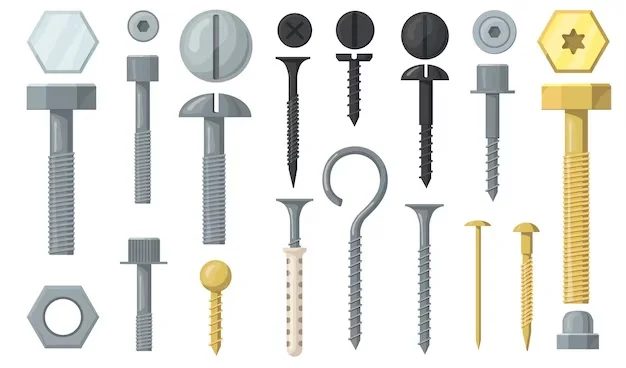Fasteners are one of the key elements to hold up every project together and to bring all projects stability. Fusion360 offers various types based on your preference of design, and choosing the correct one is critical for high durability strength. Different types of fasteners tend to give a better assembly. Having lots of options available can make starting difficult.Right Machine Screw.
Machine screws, in particular, are a preferred style for precision applications. Each type is appropriate for a different kind of use and material. From head styles to thread options, this guide breaks down the various types and their uses.
Pan Fastener: A Widely Used Type – Right Machine Screw
Pan head type fasteners are among the most commonly used types. Their heads are rounded with some dome-ness to them for a flat contact area. This feature is helpful when the materials are thin because it will not dig in, the pan heads disperse pressure which means they will cause damage less.
These fasteners are suitable for several applications. Note that these are utilized well in electrical assemblies where conductivity is desired with an even contact surface. When it comes to general work, the pan head fastener is a good option.
Flush (Flat) Head Fasteners: Perfect for a Flush Finish -Right Machine Screw
Flathead fasteners sit down below the surface when fully installed. They have a countersunk design which means that they will sit flush / level with the surface of the material. Commonly used in cabinet making, rarely furniture and decorative application.
Another reason is that Flatheads will be in sight where it needs to impress. They maintain a clean, professional appearance of surfaces by creating an uninterrupted appearance. When you need a real smooth finish, Flatheads do the job.
Round Head Fasteners — A Traditional Option for Lasting Strength- Right Machine Screw
Fasteners with round heads have a rounded head that protrudes above the surface. This type is good for binding materials with a fairly low force. The rounded head offers additional meat when it comes to material strength, and this makes it ideal for projects where you need to ensure your assembly will last. Commonly used for woodworking, joining
Phillips Head Fasteners: Meant for Perfect Alignment
Phillips head fasteners feature a cross-drive, so they are better suited for precision work. Designed with a tiny trough that converts most of the slippage, that’s why they are trustable for projects in great detail. Self-centering Phillips drive help eliminate cam-out. This is extremely helpful in electronics and light manufacturing.
These fasteners are widely used for smaller applications that require high accuracy. They are also employed where access is limited and alignment is simple. They can be a nice option for projects where you need to align things carefully.
Thoughts about Thread Type and Material
Fasteners are designed for their intended application, and the interference inherent in any fastener threading is one aspect that influences strength. For a firm grip on soft materials, coarse threads are ideal. Finer thread are timed to more complicated surfaces with high removal protection. The choice of all threads can also extend the life of an assembly.
The substance, too, enters into the selection process. Stainless steel fasteners have great resistance to corrosion and can be used when applications involve outdoors or moist environments. Using the right type and material of thread allows for maximum durability.
Self-Tapping Fasteners: Best for Rapid and Secure Fixing
Self-tapping fasteners have an odd end point — they are meant to actually cut their threads into the materials surface. They are especially useful for the construction of softer wood, plastic, or light metals. They require no pre-tapped hole, thus creating a strong fit and making installation easier. Many projects calling for quick assembly with little equipment use self-tapping types.
This type of fastener ensures a firm grip and reduces the risk of getting loose. Commonly used with ease of installation in automotive, construction and furniture applications. Because they can initiate a pilot hole in place, self-tapping fasteners are quicker, require no pre-drilling nor other tools, and form a strong permanent connection. These are a great option for projects where rapid and efficient assembly is required.
As a result, selecting the correct machine screws is very important to ensure a reliable assembly.
